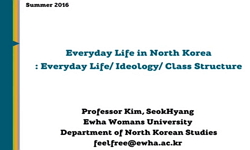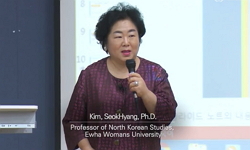This essay aims to provide a critical view of South Korean intellectuals and unification policy makers who stress the undisputed role of nationalism, across the diverse ideo-logical spectrums, in constructing ‘inter-Korea’ reconciliation in South ...
http://chineseinput.net/에서 pinyin(병음)방식으로 중국어를 변환할 수 있습니다.
변환된 중국어를 복사하여 사용하시면 됩니다.
- 中文 을 입력하시려면 zhongwen을 입력하시고 space를누르시면됩니다.
- 北京 을 입력하시려면 beijing을 입력하시고 space를 누르시면 됩니다.
부가정보
다국어 초록 (Multilingual Abstract)
This essay aims to provide a critical view of South Korean intellectuals and unification policy makers who stress the undisputed role of nationalism, across the diverse ideo-logical spectrums, in constructing ‘inter-Korea’ reconciliation in South Korean society. They contend that meanings of counter-hegemonic practice against anti-North Korean ideology are already determined within the politics of national identification. However, this mode of thinking remains a predicament of the South Korean public’s critical engagement with the way in which a moral claim to national identification is conflated with inter-Korea economic collaboration along the lines of neo-liberalism. But I also want to illuminate the connection that neo-liberalism and new conservatism in South Korea make in the attempt to help anti-North Koreanism survive democratic challenges. My critical evaluation of the connection suggests a discursive condition of what I call ‘inter-Korea sociability’, in which the South Korean public can appropriate social and historical claims about the inter-Korea relationship that range from the atrocious and violent events in the war to the so-called North Korean human rights crisis. I argue that two Koreas’ reconciliation can come through resisting the romanticization of Koreans’ own normative commitment to idealized national authenticity and liberal human rights.
참고문헌 (Reference)
1 홍석률, "민족주의 논쟁과 세계체제, 한반도 분단 문제에 대한 대응" 역사문제연구소 80 (80): 149-172, 2007
2 Rancière, Jacques, "Who is the Subject of the Rights of Man?" 103 : 297-310, 2004
3 Asad, Talal, "What Do Human Rights Do? An Anthropological Enquiry" 4 : 1-56, 2000
4 Huyssen, Andrea, "Twilight Memories" Routledge 1995
5 Sung, Minkyu, "The ‘Truth Politics’ of Anti-North Koreanism: The Post-Ideological Cultural Representation of North Korea and the Cultural Criticisms of Korean Nationalism" 10 : 439-459, 2009
6 성민규, "The psychiatric power of neo-liberal citizenship: the North Korean human rights crisis, North Korean settlers, and incompetent citizens" ROUTLEDGE JOURNALS 14 (14): 127-144, 2010
7 Cho, Hee-Yeon, "The Structure of the South Korean Developmental Regime and Its Transformation: State Mobilization and Authoritarian Integration in the Anticommunist Regimentation" 1 : 408-426, 2000
8 Gronbeck, Bruce E., "The Rhetorics of the Past: History, Argument, and Collective Memory, In Doing Rhetorical History: Concepts and Cases" The University of Alabama Press 47-60, 1998
9 Arendt, Hannah, "The Origins of Totalitarianism" Harvest Books 1973
10 Im, Chong-Myong, "The Making of the Republic of Korea as a Modern Nation-State, August 1948-May 1950" University of Chicago 1948
1 홍석률, "민족주의 논쟁과 세계체제, 한반도 분단 문제에 대한 대응" 역사문제연구소 80 (80): 149-172, 2007
2 Rancière, Jacques, "Who is the Subject of the Rights of Man?" 103 : 297-310, 2004
3 Asad, Talal, "What Do Human Rights Do? An Anthropological Enquiry" 4 : 1-56, 2000
4 Huyssen, Andrea, "Twilight Memories" Routledge 1995
5 Sung, Minkyu, "The ‘Truth Politics’ of Anti-North Koreanism: The Post-Ideological Cultural Representation of North Korea and the Cultural Criticisms of Korean Nationalism" 10 : 439-459, 2009
6 성민규, "The psychiatric power of neo-liberal citizenship: the North Korean human rights crisis, North Korean settlers, and incompetent citizens" ROUTLEDGE JOURNALS 14 (14): 127-144, 2010
7 Cho, Hee-Yeon, "The Structure of the South Korean Developmental Regime and Its Transformation: State Mobilization and Authoritarian Integration in the Anticommunist Regimentation" 1 : 408-426, 2000
8 Gronbeck, Bruce E., "The Rhetorics of the Past: History, Argument, and Collective Memory, In Doing Rhetorical History: Concepts and Cases" The University of Alabama Press 47-60, 1998
9 Arendt, Hannah, "The Origins of Totalitarianism" Harvest Books 1973
10 Im, Chong-Myong, "The Making of the Republic of Korea as a Modern Nation-State, August 1948-May 1950" University of Chicago 1948
11 Lee, Namhee, "The Making of Minjung: Democracy and the Politics of Representation in South Korea" Cornell University Press 2007
12 Myers, B. R., "The Cleanest Race: How North Koreans See Themselves—and Why It Matters" Melville House 2010
13 Hanley, Charles J., "The Bridge at No Gun Ri: A Hidden Nightmare from the Korean War" Henry Holt & Company 2001
14 Agamben, Giorgio, "State of Exception" University of Chicago Press 2005
15 Paik, Nak-chung, "South Korea: Unification and the Democratic Challenge" 197 : 67-84, 1993
16 Nye, Jr, Joseph E., "Soft Power: The Means to Success in World Politics" Public Affairs 2004
17 Spivak, Gayatri Chakravorty, "Righting Wrongs" 103 : 523-581, 2004
18 Radice, Hugo, "Responses to Globalization: A Critique of Progressive Nationalism" 5 : 5-19, 2000
19 Brown, Wendy, "Regulating Aversion: Tolerance in the Age of Identity and Empire" Princeton University Press 2006
20 Jay, Martin, "Refractions of Violence" Routledge 2003
21 Moellendorf, Darrel, "Reconciliation as a Political Value" 38 : 205-221, 2007
22 Park Soon-Sung [Pak Sunsŏng], "Pundan ch’eje ŭi mirae wa Tongbuga chilsŏ [The Future of the Division System of the Korean Nation and East Asian Regional Politics]" 103 : 313-331, 1999
23 Cho-Han, Hae-joang [Cho-Han Hyejŏng], "Pulgyunhyŏng palchŏn sok ŭi chuch‘e hyŏngsŏng [The Subjectification in the Uneven Development]" 37 : 222-247, 1998
24 "Pukhan esŏ 101 sigan, 5-hoe [101 Hours in North Korea, no. 5]"
25 Chen, Kuan-Hsing, "Paik Nak-chung’s Theory of Overcoming ‘Division System’: Rethinking the China-Taiwan Relation with Reference to the Two Koreas" 11 : 566-590, 2010
26 Nietzsche, Friedrich, "On the Uses and Disadvantages of History for Life, In Nietzsche: Untimely Meditations" Cambridge University Press 57-124, 1997
27 Foucault, Michel, "Nietzsche, Genealogy, History, In The Foucault" Pantheon Books 76-100, 1984
28 Paik, Nak-chung, "Namnam kaltŭng esŏ Hanbando sŏnjin sahoe ro [From the Internal Confrontation to Advanced Society]" 134 : 346-362, 2006
29 Munhwa/kwahak p’yŏnjip wiwŏnhoe (Culture/Science Editorial Committee), "Munhwa sahoe ro naaganŭn t’ongil ŭl sangsang haja [Let’s Imagine the Unification toward a Cultural Civil Society]" 42 : 51-77, 2005
30 Cha, Jae-Young, "Media Control and Propaganda in Occupied Korea, 1945-1948: Toward an Origin of Cultural Imperialism" University of Illinois at Urbana-Champaign 1948
31 Jeon Sang-In [Chŏn Sangin], "Kogae sugin sujŏngjuŭi [The Decline of Revisionism in the Historical Research about the Korean War]" Chŏnt’ong kwa hyŏndae 2001
32 Dalacoura, Katerina, "Islam, Liberalism and Human Rights" I. B. Tauris 2007
33 Balibar, Étienne, "Is a Philosophy of Human Civic Rights Possible? New Reflections on Equaliberty" 103 : 311-322, 2004
34 "Ikŏt i Pukhan ida! [This Is North Korea!]"
35 Ignatieff, Michael, "Human Rights as Politics and Idolatry" Princeton University Press 2001
36 Koselleck, Reinhart, "Futures Past: On the Semantics of Historical Time" Columbia University Press 2004
37 McCarthy, Thomas A., "From Modernism to Messianism: Liberal Developmentalism and American Exceptionalism" 14 : 3-30, 2007
38 Ch’oe Su-ji, "Chŏngch’aek t’oronhoe rŭl t’onghae pon haksul munhwa hyŏmnyŏk [The inter-Korea Scholarly and Cultural Cooperation Observed through the Participation in the 3rd Policy Panel Discussion of Unification]" Republic of Korea Ministry of Unification Blog
39 Paik, Nak-chung, "Barriers to Recollection in East Asia: The Case of Two Koreas and Its Regional Implications" 11 : 502-510, 2010
40 Lee, Namhee, "Anticommunism, North Korea, and Human Rights in South Korea: “Orientalist” Discourse and Construction of South Korean Identity, In Truth Claims: Representation and Human Rights" Rutgers University Press 43-72, 2002
41 Žižek, Slavoj, "Against Human Rights" 34 : 115-131, 2005
42 Wallerstein, Immanuel, "After Developmentalism and Globalization, What Next?" 83 : 1263-1278, 2005
43 Paik, Nak-chung, "87-yŏn ch’eje ŭi kŭkpok kwa pyŏnhyŏkchŏk chungdojuŭi [Beyond the ’87 Regime to a Middle-Ground Revolutionary Strategy]" 139 : 91-130, 2008
동일학술지(권/호) 다른 논문
-
LIKE BIRDS AND BEASTS: JUSTIFYING VIOLENCE AGAINST CATHOLICS IN LATE CHOSŎN KOREA
- 계명대학교 한국학연구원
- FRANKLIN RAUSCH
- 2012
- KCI등재,AHCI,SCOPUS
-
- 계명대학교 한국학연구원
- BRUCE FULTON
- 2012
- KCI등재,AHCI,SCOPUS
-
RECASTING THE 'INTER-KOREA' IN NATIONAL RECONCILIATION
- 계명대학교 한국학연구원
- MINKYU SUNG
- 2012
- KCI등재,AHCI,SCOPUS
-
SEPARATING FROM THE CONFUCIAN WORLD: THE SHIFT AWAY FROM SYNCRETISM IN EARLY KOREAN CATHOLIC TEXTS
- 계명대학교 한국학연구원
- DEBERNIERE JANET TORREY
- 2012
- KCI등재,AHCI,SCOPUS
분석정보
인용정보 인용지수 설명보기
학술지 이력
| 연월일 | 이력구분 | 이력상세 | 등재구분 |
|---|---|---|---|
| 2023 | 평가예정 | 해외DB학술지평가 신청대상 (해외등재 학술지 평가) | |
| 2020-01-01 | 평가 | 등재학술지 유지 (해외등재 학술지 평가) |  |
| 2012-02-27 | 학회명변경 | 영문명 : institute of korean studes -> Academia Koreana |  |
| 2010-01-01 | 평가 | 등재학술지 선정 (등재후보2차) |  |
| 2009-01-01 | 평가 | 등재후보 1차 PASS (등재후보1차) |  |
| 2007-01-01 | 평가 | 등재후보학술지 선정 (신규평가) |  |
학술지 인용정보
| 기준연도 | WOS-KCI 통합IF(2년) | KCIF(2년) | KCIF(3년) |
|---|---|---|---|
| 2016 | 0.3 | 0.27 | 0.27 |
| KCIF(4년) | KCIF(5년) | 중심성지수(3년) | 즉시성지수 |
| 0.35 | 0.31 | 0.676 | 0.05 |






 KCI
KCI





